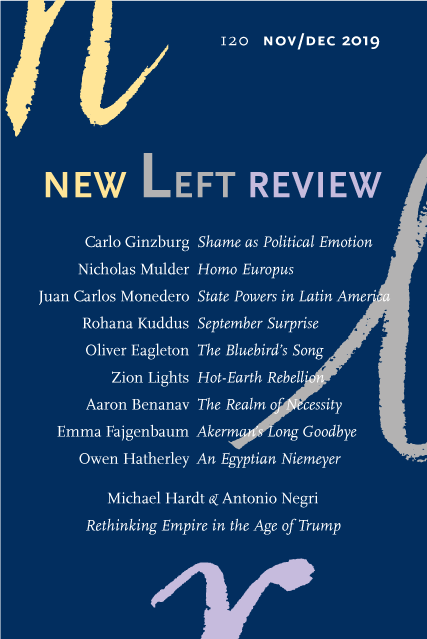Amid ongoing political turbulence in Latin America, Juan Carlos Monedero mobilizes the resources of state theory, from Gramsci to Poulantzas, to provide a comparative critical analysis of the cycle of left governments in Venezuela, Bolivia, Ecuador, Argentina and Brazil.
Is shame for one’s country, not love of it, the truer mark of belonging? Lineaments of a political emotion, at the intersection of biology and history, from Nestor’s invocation on the battlefield of Troy to Primo Levi’s remembrance of the Red Army. How might we imagine the boundaries of a shame-based community?
As Jean-Claude Juncker steps down from the European Commission, reflections on his career as synecdoche for the political culture of the EU—and the passage of his homeland, the Grand Duchy of Luxembourg, from steel producer to financial lair.
If Empire was, for many, the signature text for the age of globalization, how do its theses fare now, in an era of rising nationalism and protracted crisis? In a landmark update, the authors examine how the twin spheres of power and (re)production have spun out of sync—symptoms of a system that, in Deleuze and Guattari’s words, works by breaking down.
What is the wider meaning of the recent mass youth protests across the Indonesian archipelago—Java, Sumatra, Papua, Sulawesi, Bali—and what do they portend for the second term of Jokowi, once the Obama-style candidate of ‘hope and change’?
Interview with a leading activist from Extinction Rebellion. How the UK’s new climate militants adapted civil-disobedience theories and ‘flat management’ structures to shut down central London in the name of environmental emergency.
Concluding his two-part analysis of technological development and global labour-market dysfunction, Aaron Benanav rebuts the automation theorists’ call for Universal Basic Income with a counter-proposal. Can we invent the future by working backwards from the world we want to build?
Owen Hatherley on Salma Samar Damluji and Viola Bertini, Hassan Fathy: Earth & Utopia. A full-scale study of the radical mud-brick designs of Egypt’s pre-eminent modernist architect.
Emma Fajgenbaum on Chantal Akerman, My Mother Laughs. Part memoir, part chronicle of a troubled-tender relationship, the film-maker’s final book.
Oliver Eagleton on Richard Seymour, The Twittering Machine. A Marxian-Freudian polemic against social media, seen as irredeemably hostile to progressive politics.
